Consumers’ Desires in Hostels: Addressing Latent and Explicit Needs in United States Hostels
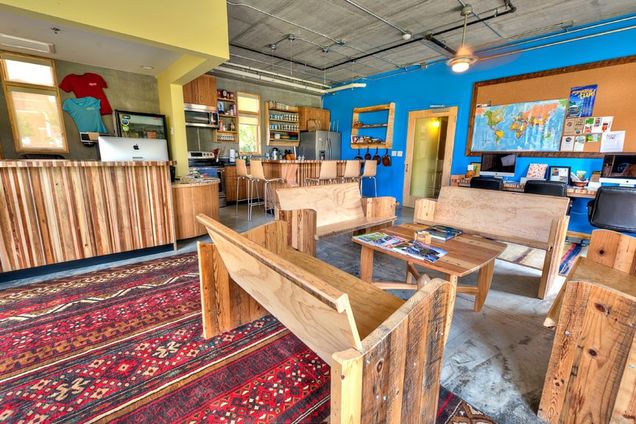
By Emily Horton
Hostels: typically one’s mind pictures a grungy dorm-style hotel filled with overstuffed backpacks and its owner, a 20-something college student trekking their way through Europe. Huffington Post’s “22 Things You Should Know Before Staying in a Hostel” list captures popular American beliefs about hostels; they are home to bed bugs, mildewed showers, future life-long friends from around the world, and well-vetted insider information about any given city. Despite many backpackers willing to stay in these ultra-affordable lodgings that are known to lack amenities and sometimes cleanliness, is there more to the hostel consumer than meets the eye?
The Hostel & Lodging Landscape in America
Hostels do exist in America, but according to Hostel World, they account for only three percent of properties [internationally] and 10 percent of global hostel revenue. Aaron Chaffee, Vice President of Hostel Development at Hostelling International USA says this statistic shows Americans’ reluctance to use hostels while in the United States due to a lack of cultural acceptance. Hostels are not remaining stagnant, instead they are rapidly adapting to changing consumer needs to help put American hostels in the lodging landscape.
New desire and needs from hostel consumers are fueling change in the industry. Even just 15 years ago, according to Chaffee, guests were merely looking for a place to rest their heads, kitchens to cook their own food, and a common room to meet fellow travelers. However, during the economic change over the past seven years, Carina Perkins of Big Hospitality reported that as of 2014, consumers drastically shifts towards luxury and budget hotels leaving the middle price range hotels without a large guest base. Many of those mid-range hotels in Europe switched to the hostel market, offering services that the Hostel Trend Report stated millennials are now craving: free wifi, on-site food and beverage, daily cleaning services, social events, bicycle rentals, libraries and media centers.
Along with the evolution of hostels themselves and the change in the hotel market, the introduction of new competition has altered how hostels must address guests’ needs. Airbnb, an online platform where any homeowner or apartment dweller can rent out rooms or entire abodes to travelers, upset the system when it was introduced in the fall 2008. The amenities that Airbnb provides, such as more privacy, home-like feel, cultural immersion with locals, and suitability for group travel, shifted the expectations of future guests. Already homes and apartments, Airbnb’s are designed to be comfortably lived in as opposed to hostel bunk beds with shared shower stalls. Airbnb’s offering is a heavy influence on the shift of hostel amenities and design to its already community-focused and low price value points.
Addressing Latent Needs: Separating Good from Great
During a phone interview, Aaron Chaffee discussed that merely adding new services is not what will draw people into hostels. “It is not just ‘bling’ to add fancy things.” Instead, he said hostels need to strategically look at what guests’ explicit and latent needs are and how to address them in a cost efficient manner. Explicit needs, like a bed, common area, or kitchen, may not be thought about in great detail because they serve as points-of-parity among all hostels. Meeting latent needs is what separates good hostels from incredible hostels. Chaffee explained that a hostel guest will not likely check-out and think, “That reading light, or shelf really made my trip,’ but addressing latent needs can influence a guest to feel, ‘That was a truly great experience.’
Addressing latent needs does not mean using notable architects to design the lobbies and entrances; these amenities could be a library of rental books or electrical outlets in the lockers so guests can safely charge their laptops while away from the hostel. These details are the small necessities that will create a satisfied guest experience; however, guests do not always know how to express these needs. Hostelling International – USA uses a combination of surveys, focus groups, and research studies to address the concept of latent needs. Research of this caliber is not always feasible for an independent hostel, therefore it relies on guest feedback, surveys, and industry trend reports.
The hostel industry experiences classic hospitality barriers of intangibility, inseparability, variability, and perishability with marketing and product explanation, therefore addressing latent needs becomes vital in the comprehensive hostel experience. When a guest books a hostel, he or she can only base expectations off of reviews, photos, or website copy. If a hostel, or any hospitality business, sets the expectations at the correct level, amenities that address latent needs can be used to enhance the value of the experience. These small amenities cannot be gauged by online search; it is near impossible to estimate expectations that a guest does not even know he or she has. Yet attempting to find and meet those needs will improve the consistency of guest satisfaction because there is no variability with most structural amenities, such as the aforementioned reading light. As long as amenities and expectations are well maintained, it can be expected that most guests will be satisfied, therefore increasing the overall value of a hostel stay.
Crashpad: A New American Hostel Experience
Crashpad, based in Chattanooga, Tennessee, is an example of a hostel that has done just that; acknowledged latent needs in order to provide a fulfilling and satisfying experience for a variety of guests. The hostel was started by Boston-area rock-climbing enthusiasts Max Poppel and Dan Rose. The pair relocated to Chattanooga, a rock-climbing mecca in the United States, and noticed a lack of lower priced lodging options (<$100 per night) that still offered the amenities of a budget hotel. At first, the two attempted to start a campsite, but the start-up fees and zoning issues created a more challenging barrier than excepted. A hostel became the best middle ground, offering the comradery of a campsite and running water, year round functionality, and access to a broader age-range of customers. In a phone interview with the author, Bethyn Merrick-Nguyen, General Manager of Crashpad, explained that the company’s target market is focused on outdoor aficionados, which is whom Chattanooga generally appeals to as a whole Most of Crashpad’s employees are avid rock climbers, kayakers, or hikers who can provide expert recommendations to guests.
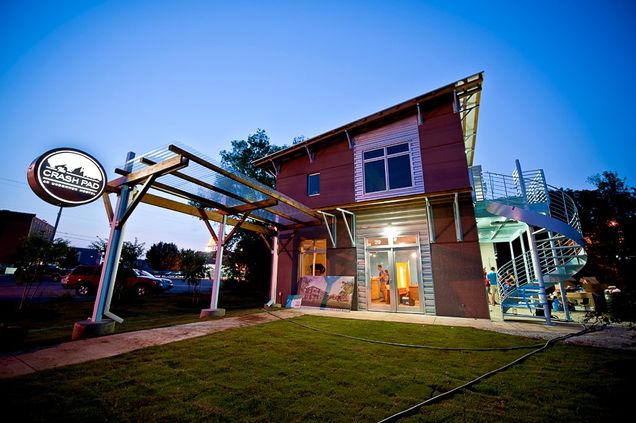
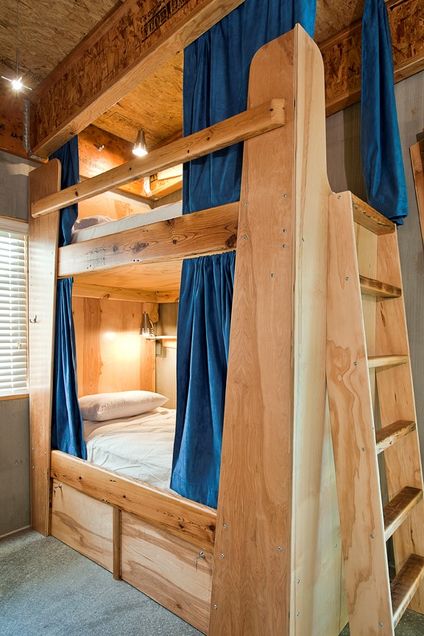
Environmental & Local-business Friendly
Knowing its clientele are primarily outdoor adventure seekers, Crashpad offers specific types of amenities to its guests, many catering towards latent needs. For example, Crashpad is a LEED Platinum certified for its sustainability and resource efficiency efforts, a quality that is in-tune with its many environmentally conscious guests. Whether staying in a sustainable environment is a latent or explicit need, it is a quality that is appreciated by most of its guests. The poured concrete building with an open concept allows for adequate individual space, quite floors, and less need to open and shut doors. Merrick-Nguyen explained that although most guests do not consciously say that this is a great benefit, no one likes to hear the dorm door opened ten times a night and have their bunk-mate walk over old wooden floors to get there.
Crashpad also created multiple partnerships with local green businesses. The pantry is stocked with local spice blends and coffee beans, the bathroom has hand-crafted soaps, and even the bed frames and concrete sinks were handmade by local craftsmen. The company’s appreciation for local, eco-friendly products permeates through its purchasing patterns, eventually influencing how guests perceive its brand. Crashpad also utilizes its partnership with a local bakery to provide breakfast ingredients for all of its guests at no additional cost. After weighing the costs and benefits, the owners chose to only supply ingredients, giving the guest freedom to create their own meal.
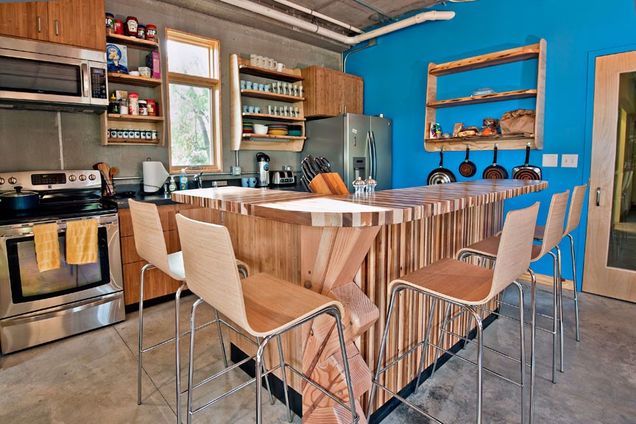
Utilizing the hostel kitchen is just one of the gastronomical options that Crashpad provides. Two years after opening Crashpad, the owners opened Flying Squirrel, a neighborhood restaurant and bar right next door. According to an article on Noog.com, the goal of the hostel is to breakeven while the goal of the restaurant is to generate profit; however, the hope is that the combination of the two attractions in such close proximity will create a close community atmosphere (Morrison). Guest trends show preference to hostels that included attached or in-building food and beverage operations, similar to that of a budget hotel that shares a building or parking lot with a restaurant. However, just as guests’ expectations for accommodations are increasing, their expectations of food and beverage quality are too. The Flying Squirrel is meant to achieve the perfect combination of hostel amenity within a vibrant neighborhood dining scene.
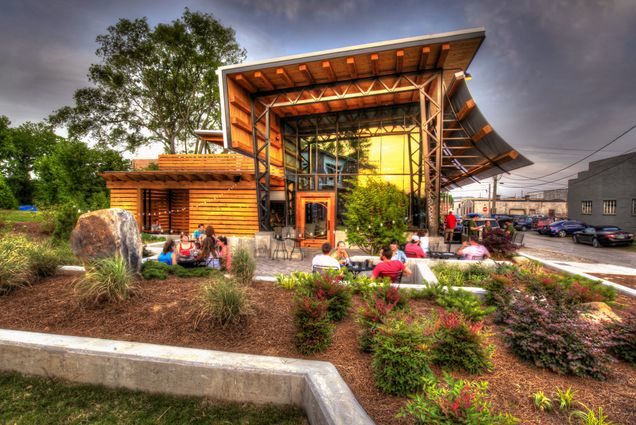
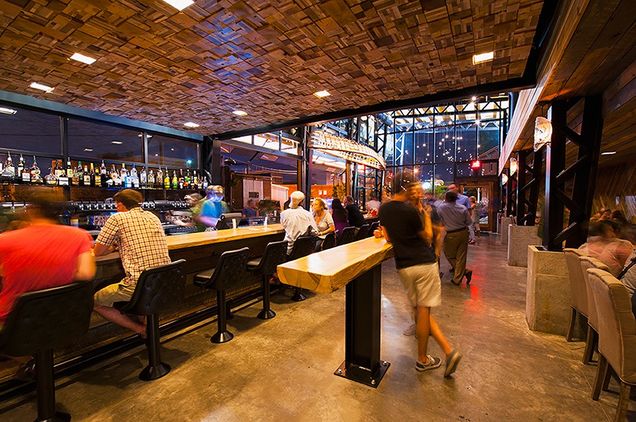
Change in Perception Leads to Change in Demand
As hostels continue to improve and cater to new guests’ needs, a change in American perception of hostels needs to occur in tandem in order to achieve greater success. Chaffee explained, “If you describe a situation where a college student takes a summer trip, or right after graduation someone travels around Europe and they use a EuroRail pass, they stay ____________, and ask them to fill in that blank, people will say hostels. It is not that Americans do not know what hostels are, they just don’t think to use them in America.” Chaffee explained that in Europe, weekend trips are taken more often while children are growing up, and families often use hostels as an affordable, social accommodation with easy access to a city. There is both a plethora of hostels and a high demand from local residents and foreign travelers, creating the perfect model for growth of the hostel market.
In the United States, however, demand is lacking. Even travelers who are just staying one night in New York City rarely think of staying in a hostel. Chaffee attributed this to both a lack of supply and a lack of integration within American culture. Hostels do not maintain a high place of mind for consumers, therefore there is a correlating lack of demand. Lack of demand leads to a gap in hostel supply, overall creating a cycle of decreased supply and lack of demand within the culture. Both Hostelling International USA (HI-USA) and independent hostels are tackling this in their own way. HI USA is placing more emphasis on what hostels can provide besides just an overnight stay, such as broadening cultural experiences. Chaffee explained that HI USA hopes to create an image where an experience at a hostel is seen as a truly authentic one that can create cultural understanding and awareness. He elaborated, “A hostel stay isn’t just an affordable and cheap stay – it offers a new sense of tolerance and a new way to learn about cultures.”
Crashpad’s strategy is helping to erase the stigma that hostels are filled with old sheets and dirty showers. “Getting people in the door is the most important thing to change peoples’ minds of what a hostel is. Most people are very open, some even come in saying, ‘What is a hostel, explain it to me’ and we do,” said Merrick-Nguyen. The company’s website and social media channels provide an inside look at the experience by sharing photos of the design and cleanliness of the building. Additionally, user-generated content on social media allow guests the opportunity to publicize their experience and influence lodging habits, hopefully towards hostels.
Between balancing latent needs and explicit needs, along with creating an overall positive and inviting guest experience for a low cost to the owners and a low price to the customers, running a hostel can seem like a fruitless pursuit with such low demand in the United States. However, with the increase of quality in supply, especially in California and the Northeast, Americans are starting to gain US hostel experience. Combined efforts of the international hostel groups and independent hostels are making task of increasing awareness become more manageable. Through all these changes, hosteling in the United States shows promise of becoming a popular and enjoyable alternative to low cost hotels, especially for those who crave an authentic social experience.
 Emily Horton is a recent graduate of the Boston University School of Hospitality. With experience in both front and back of house of notable Boston restaurants, along with experience in social media marketing, she plans on working in all aspects of the food and beverage industry, wherever in the world it may take her.
Emily Horton is a recent graduate of the Boston University School of Hospitality. With experience in both front and back of house of notable Boston restaurants, along with experience in social media marketing, she plans on working in all aspects of the food and beverage industry, wherever in the world it may take her.
PDF Version: Consumers’ Desires in Hostels Addressing Latent and Explicit Needs in United States Hostels
4 comments
Step into our spacious and stylishly appointed marina hotel apartments , thoughtfully designed to provide the utmost comfort and convenience. Each unit boasts modern decor, luxurious furnishings, and state-of-the-art amenities, creating a soothing ambiance that feels like a true home away from home.
Take a break from the hustle and bustle of city life and indulge in the natural beauty and cultural treasures that Fujairah offers. From wandering through ancient forts to basking on sandy beaches, you’ll find yourself in a world where past meets present, and adventure awaits at every corner. Whether you’re planning a family weekend getaways , a romantic escape, or a solo adventure, Fujairah has the perfect blend of experiences to cater to your desires.
These advanced carts are equipped with technology that allows customers to effortlessly navigate the store, access access shoprite.com product information, and even make payments without the need for a traditional checkout process.
By taking the Wawa survey at http://Www.MyWawaVisit.Com get a chance to win a $25 Gift Card & Free Hoagies for a year.